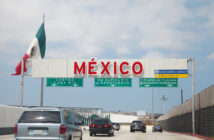Three months after FAIR reported on extra-continental migrants heading to this country, their ranks are swelling.
Recently a U.S.-bound caravan of 400 sojourners from Ivory Coast, Sierra Leone, Senegal, Haiti, Pakistan, India and Bangladesh clashed with Peruvian police. With Panama reopening its southern border at the Darien Gap, the march is on.
Foreign nationals from 23 countries were among the hundreds of extra-continentals transiting through Honduras last year, with Somalis (187) and Syrians (182) leading the parade.
Last month, 11 Iranians were detained as they crossed into Arizona near Yuma. Customs and Border Protection agents in the sector said it is not uncommon to encounter migrants from “Special Interest Countries” known to harbor terrorists or foment terrorism.
Whatever the migrants’ origin, Mexican cartels are profiting from the far-flung human traffic. Smugglers charge an average of $5,000 for each Chinese national while Russian and Arab migrants pay $9,000, according to conservative figures in a new report.
National security experts say the current “overwhelming” rush of migrants to America’s southern border makes it increasingly difficult to identify and apprehend extra-continentals. “Unless dramatic steps are taken, this extra-continental flow is going to add to [the]migratory problem,” said Alan Bersin, a fellow at the Woodrow Wilson International Center.
Last week, the Biden administration issued “Interim National Security Strategic Guidance” that acknowledged, “Recent events show all too clearly that many of the biggest threats we face respect no borders.” But the 24-page paper never gets around to proposing actual enforcement. It glibly states, “We will not be able to solve all of the challenges we face at the southern border overnight,” while ignoring the fact that White House policies are exacerbating the border problems daily.
Whether Team Biden takes the extra-continental push seriously or not, officials can’t say they weren’t warned. A Homeland Threat Assessment, published by the Department of Homeland Security (DHS) last October, declared that the U.S. was vulnerable Foreign Terrorist Organizations (FTOs) using illegal migration channels.
The DHS assessment advised that Transnational Criminal Organizations (TCOs) “intermingling with migrants traveling to the U.S. Southwest border pose an intrinsic risk to the U.S. lawful immigration system.





4 Comments
Pingback: Extra-Continental Migrants Blend With Border Rush | 198 Immigration News
Pingback: You Know It’s Bad When the President of Mexico is Telling You to Cool It | South Green Blog
Pingback: You Know It’s Bad When the President of Mexico is Telling You to Cool It - VBLSA
Pingback: You Know It’s Bad When the President of Mexico is Telling You to Cool It – Bio tox gold